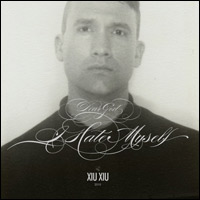
Dear God, I Hate Myself
Kill Rock Stars
Sometimes, based on his lyrical delivery, it’s hard to tell if Jamie Stewart is joking or not. “I will always be nicer to the cat than I am to you,” he chokes out in a pained warble on the title track of Xiu Xiu’s new album, Dear God, I Hate Myself. But that’s pretty harsh, so he can’t be serious, can he? On “Chocolate Makes You Happy” he nonchalantly croons, “Out of your mind with whoreishness, incredibly young, incredibly filthy,” as if he were just throwing the scathing judgment out there in passing. Is this really how things are in the imagined world of Xiu Xiu?
It’s easy to miss the lyrics on this album, as it’s filled with more of the vaguely distracting glitched sounds that become more prevalent on the band’s the last album, 2008’s Women As Lovers, while both of the aforementioned songs possess a subsonic bass that leads to head banging before lyric contemplation. Taken as a whole, Dear God is pop music. It just so happens that it’s veneered in a decoupage of weird percussion sounds and synthesized atmospherics. While the melodies are simple, the compositions of these songs are akin to tiny symphonies. They’re complex and challenging, never boring to sit through, and yield new discoveries at almost every listen. The attraction to Xiu Xiu is not that Stewart sings about burning his hand on a stove (“Thee Fabrizio Palumbo Retaliation”) or that he exhorts someone to “beat (him) to death” (“Gray Death”) or any of the other pseudo-psycho, sexual, murderific, horror scenarios. It’s that the music is consistently easy to listen to across the board. Stewart could hand these songs off to Taylor Swift and launch a second career as a star maker. As it stands, he is damned to slum it in the indie rock world with the weirdos and the freaks—and we should be thankful for it.
Michael P. O’Shaughnessy
MP3: “Gray Death”

One-Armed Bandit
Ninja Tune
It’s a given at this point that most of the great jazz albums of the next and last five years have and will come from Scandinavia. Jaga Jazzist, meanwhile, is busy making the case that the region’s going to take over the post-rock side of things as well. With their potent blend of nu-jazz grooves and their willingness to throw every sound their wind instruments and classic Casios can make into the sink and just let it overflow, they find new realms of outness and new ways to make their music swing on One-Armed Bandit.
It doesn’t all work, and at times, one can get the feeling of being stuck in an outtake from the Miami Vice soundtrack—as performed by the Monty Python players. But when it all comes together, the album is pretty magnificent. Case in point: the Bergman-esque “Toccata.” At nine minutes long, it’s the record’s finest performance and its literal centerpiece, a showcase for the band’s ability to weave textures in a complex structure that’s somehow both mesmerizing and startling. It starts as a light, but appropriately fleet-footed, workout for organ, piano and mallets, then adds the rhythm section and keeps layering on sound as the slowly building tension occasionally bursts into sudden displays of drama. It’s the work of a band enjoying their kinesthetic rapport and simultaneously pushing it close to the breaking point. A few years ago when they did this kind of thing, they could just barely kept it together, and the reward was the exhilaration of watching them stay narrowly ahead of the crash. Now the thrill is in hearing them confidently riding the wave, showing off a few new tricks and big risks that ultimately pay off.
Matt Slaybaugh

Escape
Woodsist
To guitarist Ripley (or Erik as he is named here) Johnson, it’s apparent that Moon Duo is another luxurious exploratory autobahn of boogie upon which his ship rides. But to those that ignore nuance, Escape, his full-length debut with Sanae Yamada for Woodsist, might ring like the hallway of a uniformed Wooden Shjips smoke-out. Cry foul if you want. After all, their first offering, a 12-inch for Sacred Bones, did tend to sputter, shifting at the controls without taking off. But as Johnson has more or less already carved out his name into the ether with that other band, he’s more than free to indulge in a no-holds barred paean to Suicide and Cluster.
His playing has its own voice, speaking in hypno-tongues while still worshipping the deepest of Kraut vaults and the paisley mystique of San Francisco psych in the ’60s. Those eras, as evidenced here, are related almost interchangeably, feeding off each other. When “In the Trees,” a seven-minute jam, simultaneously reminds you of some dusty “Dark Star” boot, Ash Ra Tempel, and the last haiku you wrote high on nitrous, you realize Moon Duo have found a transcendental route to leave the planet. If anything, the constraints Johnson places upon himself on Escape—like only sharing that space with keyboardist/drum machinist Yamada and cramming his whimsy into actual “songs” as opposed to amorphous improvisations—sound as cathartic as the man has been in his short career on tape. The title track, neatly organized into a tuneful surf cruise, glides away in the second half, mind-fried and sunshine nonstop. It’s difficult to really ingest the self-proclaimed influence of Coltrane on so many modern psych guitarists, but Johnson’s irreverent rattle out of bounds on nearly every track here, especially the monolithic tower of noise that engulfs “Stumbling 22nd St.” has me dialing to meet his guru. I can’t wholeheartedly recommend the record to those who don’t possess the patience to truly worship a Wooden Shjips jam, if only because this adventure requires less imagination and a complete lack of inhibition. Ride on.
Kevin J. Elliott
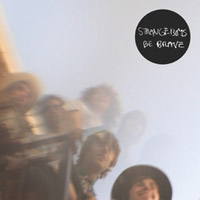
Be Brave
In the Red
Kind of the Hollies to the Black Lips’ Rolling Stones, Austin’s Strange Boys make nice with their rootsy racket, to the point you almost forget this nth generation garage scene came from something that could be loosely described as dangerous. Now it ain’t like the Strange Boys have ever tried to make you back away slowly. If anything, since their 2006 inception and their blog-bolstered 2008 debut album, And Girls Club, they’ve guitar-jangled and vocally warbled right along with their scraggle-punk messiness. Now on this sophomore slab, they definitely rocking-chair it back and forth into an even drowzier, more melodic shade, but don’t really clean things up otherwise. Apparently, they jumped right into whipping up this album mid-tour, with no worries of impressing any new ears after those blog hoists and a successful UK jaunt. Probably a smart move for our A.D.D. era.
Like contemporaries the King Khan & BBQ Show, Vivian Girls and the aforementioned Lips, the Strange Boys drip first-album Velvet Underground guitar clank onto their canvas (“Night Might,” “Da Da”) and have added in hues like skronky sax (“Be Brave”). Sambol’s yearning warble has become almost distractingly affected, especially on the most laidback laments (“The Unsent Letter,” “Dare I Say”). For all their desire to be “authentic”—whatever that may mean in our virtual world—that kind of straining tends to make the Strange Boys feel like the bearded Brooklyn wannabe moonshiners they probably mock.
But the band’s general “Keith Richards at an off-campus afterhours” vibe flows like convenient store wine—neither the earlier in the evening destruction of the Black Lips nor the Sunday morning four-track plug-in of most bands left idling in the garage. Which again makes them kind of unique.
Eric Davidson
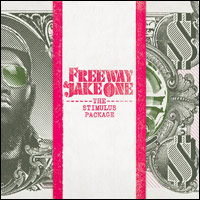
The Stimulus Package
Rhymesayers
For Philadelphia rapper Freeway, The Stimulus Package is a triple entendre. On the surface, the title is a direct shout-out to the U.S. economic recovery plan. But it also comes to mean a bundle of drugs exchanged between the characters of songs like “The Product.” And, as a metaphor for the songs themselves, it’s intended to represent a shot of energy injected into a hip-hop climate arguably lacking in substance. Seattle-based producer Jake-One does his best to justify this last claim, displaying impeccable taste in his selection of ’60s and ’70s soul samples to provide a compelling backdrop for Freeway’s raspy dynamic flow. And while the rapper’s verses aren’t always as enthralling as those of the classic mid-90s rappers The Stimulus Package lovingly recalls, the album is a welcome antidote to the faux-futuristic dance-rap currently dominating the airwaves.
Those eagerly awaiting Madvillainy 2 will enjoy first single “You Know What I Mean” and its crackling ancient-sounding samples and low, wandering bassline. “Sho-Nuff” is a dense sound collage accented by piano flourishes, crisp bells, and muted trumpet runs to sound like something Four Tet would make if he produced hip-hop. And on “One Foot In,” Jake-One contorts chopped vocal samples around a head-nodding gangsta rap beat.
The music on most tracks clearly overshadows the rhymes, yet that’s not to say the record would be better without Freeway. Despite the fact that the lyrics rarely dig below the surface of topics like snitches and bitches, Freeway shows an impressive command of catchy, visceral choruses on songs like “Throw Your Hands Up,” and he is able to effortlessly alter the rhythm and speed of his flow to fit some of Jake One’s more unpredictable beats. The Stimulus Package is hardly the saving grace to mainstream hip-hop’s creative recession that it aspires to be, but it’s definitely a step in the right direction.
David Holmes
MP3: “Know What I Mean”
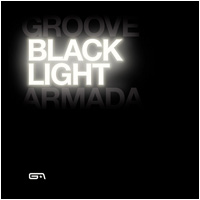
Black Light
Om
It would seem that, after five albums, everything you’ve ever known about Groove Armada, is all you need to know. With their cheeky hit, “I See You Baby,” and regular appearances on video game soundtracks, the British duo of Andy Cato and Tom Findlay has successfully trafficked in “big beat” dance music with the occasional detour into tasteful chill-out tunes. Well, table your expectations because they’ve flipped the script with their sixth album, Black Light.
Reportedly inspired by the bands they booked for the Lovebox Festival and a revisiting of favorites such as Roxy Music, Gary Numan and New Order, Groove Armada decided to take Black Light in a rock direction. And it’s to their credit that they didn’t half-ass it. It would have been fairly easy to graft some live drums and screaming guitar parts into what they’ve always done, but instead they enlisted the help of their touring band during the recording sessions.
The difference is immediate and drastic. It’s one thing to follow inspiration, but it doesn’t matter if the finished product doesn’t deliver. For the most part, Black Light succeeds, but there are some missteps. The opener “Warsaw” is like an over-processed cross between Arcade Fire’s “Keep The Car Running” and a New Order outtake. It’s like being shouted at over the telephone. It’s tempting to place some of the blame on guest vocalist Nick Littlemore, as there are some similar issues on “Cards To Your Heart,” but then he turns in some of the best performances with “Not Forgotten” and “Fall Silent.” It seems that he benefits when the music provides the subtlety that his voice lacks.
However, Groove Armada more often than not provides the right tune to the right vocalist. Bryan Ferry turns in a typically well-tailored vocal turn on the slow burning “Shameless,” while newcomers SaintSavior and Jess Larrabee get a number of starmaking turns. Black Light is a smartly put together record that may not ignite the dancefloor, but does show that Groove Armada shouldn’t be taken for granted.
Dorian S. Ham

American Gong
Kill Rock Stars
While nothing on this release is as dour as the antics on Featuring “Birds” or as fiercely partisan as Hot Shit, on American Gong, Quasi do a great job of erasing any time that’s passed since those turn-of-the-millennial documents. A little feedback, a few ragged chords, and four minutes of gloriously nasal choruses later and album-opener “Repulsion” has you convinced it might as well be 1999. And if that doesn’t do it, wait till “Bye Bye Blackbird,” which lifts its opening riff almost wholesale from a Tripping Daisy single (“I Got A Girl”)—it sounds like the ’90s nostalgia is in full effect.
But don’t think the PDX trio is actually looking backwards, though, since the music sounds as energetic as anything they did 10 years ago, and often moreso. “Black Dogs & Bubbles” is a perfect example and a near-perfect song of jangly Southern rock guitars and a nice walking bassline before the metal hammer is brought down hard and it turns into a Sabbath rite before slowing to a gloomier denouement. We could also discuss the distorted balladeering of “Everything Or Nothing At All,” the thick, guitar-laden grooves of “Now What,” Sam Coomes’ balls-to-the-wall wailing on “Death Is Not the End,” or Quasi’s undiminished knack for caustic couplets. Years have passed since what seemed like Quasi’s heyday, and you may have thought they were ready to release a “greatest hits” collection and fade away. But in fact they’re far from burned out, and you’d have been very, very wrong.
Matt Slaybaugh
MP3: “Repulsion”
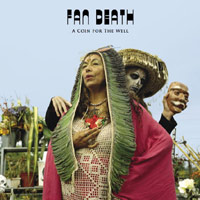
Coin for the Well ep
Last Gang
As the eminent Korean urban legend states, an electric fan, if left running overnight in a closed room, causes death to the person or persons inside. This is known as “fan death” and it’s the inspiration behind the five-piece electronic outfit of the same name. A ridiculous myth, sure, but that doesn’t seem to mitigate the peoples’ fear of fans and closed doors. It’s strangely similar to the way Fan Death (the band) operates. producing vague, straightforward electronic disco music fit for the early ’80s that doesn’t seem to mitigate the hype or adoration they receive from outlets such as NME, The Fader, and Nylon Magazine. Yet Fan Death’s new EP, A Coin for the Well (they’re in the process of working on their debut full-length), does nothing to expand their range either.
The EP offers five tracks of watery disco melodies laden with tinges of gaudy keyboard riffs and reverb. Coin starts off promising with the upbeat, infectious toe-tapper “Reunited,” which in turn segues into the catchy, string-laced, and certainly dance-worthy “Cannibal.” From there, however, the record wanes in both originality and memorability. The final three songs, especially sluggish closer “Son Will Rise,” are slightly ambiguous and monotonous, seemingly filler material on an already short offering.
True, Fan Death’s music, at least on this EP, may not be the most revolutionary sound on the planet, but they exist in a realm of music where skill-level and originality isn’t scrutinized quite as narrowly as other genres. That is, Fan Death seem to fill that certain niche of music meant for social listening. It’s pump-up music, and Coin for the Well ultimately succeeds in a 1980s cocaine-fueled dance-party sort of sense.
Jennifer Farmer
ALBUM REVIEWS
Massive Attack, Heligoland
Juliana Hatfield, Peace & Love
Field Music, (Measure)
Tindersticks, Falling Down a Mountain
The Knife, Tomorrow, In a Year
Untied States, Instant Everything, Constant Nothing
Leatherface, The Stormy Petrel
Efterklang, Magic Chairs
Pantha du Prince, Black Noise
You Say Party! We Say Die! XXXX
Puerto Muerto, Drumming for Pistols
U.S. Girls, Go Grey
The Watson Twins, Talking to You, Talking to Me
Ashley Beedle Presents Mavis
